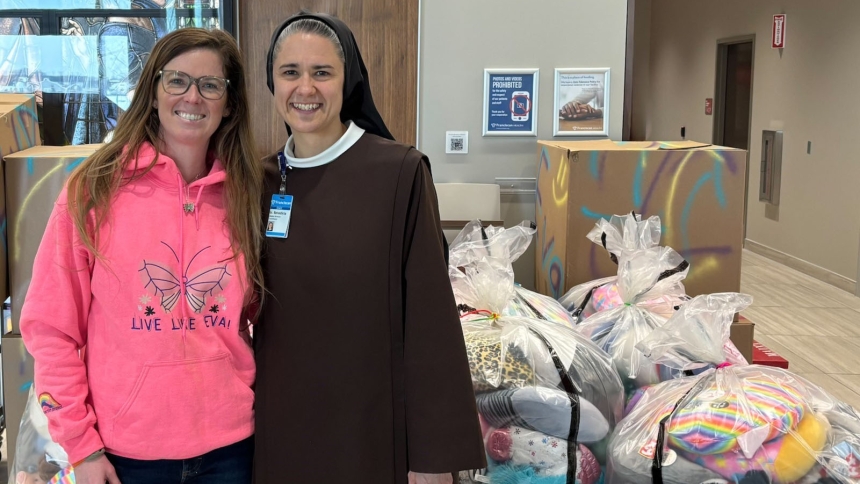
As published in the Northwest Indiana Catholic on April 30, 2017
This Sunday’s Gospel is the one I would like proclaimed at my funeral Mass - the Appearance on the Road to Emmaus in Luke Chapter 24. This resurrection narrative is richly complex in structure and meaning, containing profound lessons regarding our understanding of Jesus, our mission as disciples and the role of the Church.
The structure of the Mass is one way to view the text. Just as the Eucharist is composed of the Liturgy of the Word and the Liturgy of the Eucharist, so, too, the Emmaus text tells us that first Jesus proclaimed and explained the Scriptures through the lens of his own resurrection, and then he performed the characteristic Eucharistic gesture at the end of the day, as he took bread, blessed and broke it. The disciples’ eyes were opened to recognize him in this liturgical experience.
Some Biblical commentators have expounded another interpretation that I find insightful.
If Jerusalem is the spiritual center of the Jewish nation, the city in which Jesus rose from the dead and the place where the early Church is gathered, then the two disciples on the road to Emmaus are walking in the wrong direction, away from the risen Christ and the community.
In their shock and grief at the death of Jesus, they are blind to where they should be. We do not know where they are exactly headed, but we can safely assume they are fleeing the grief and violence of Good Friday.
Unbidden and unrecognized, the risen Christ begins to walk with them. He does not chide them for going in the wrong direction, but rather accompanies them in their confusion and sadness. Through conversations and questions, he touches the sorrow of their wounded hearts and proclaims his own resurrection, contextualized through the Hebrew Scriptures, as the new meaning of human history and the victory of life, mercy and salvation over death, sin and despair.
By articulating and explaining Easter to these two troubled disciples, Jesus turns everything around for them - their understanding of God, life, their own purpose and their religious beliefs.
Pope Francis speaks frequently of this need for pastoral accompaniment, to walk with our brothers and sisters, even when they are lost in sin and confusion, even when they are moving away from the Lord and his Church, and especially when they are troubled, despairing and confused.
Everyone in the Church has the call and responsibility to accompany others through the pilgrimage of life. Whether we are priests, deacons, religious, lay ministers, parents, teachers, coaches, students, friends or fellow workers, many people we rub shoulders with every day need our attention, love, friendship and help. When we truly listen to another person with our hearts, they will tell us everything, just as the two disciples poured out their souls to this mysterious fellow traveler.
When people contact our parishes, seeking a baptism, funeral or marriage, the primary question should not be: Are you a registered member here? We need to welcome, listen and attend to our brothers and sisters who, however imperfectly, are seeking God in their lives in this moment, even if they are not active members of our communities.
I know parishes in other dioceses where the pastor will not even discuss the possibility of celebrating a sacrament if the people seeking it are not contributing members of the parish. Yet the same pastor spends thousands of dollars on evangelization programs to bring new people into the parish. Go figure!
The power of loving and accepting people as they are, walking with them in the concrete circumstances of their lives and witnessing the love, truth and mercy of the risen Christ to them is transformative and can lead to spiritual conversion and life transformation.
In Luke 5:31-32, Jesus says, “Those who are healthy do not need a physician, but the sick do. I have not come to call the righteous to repentance but sinners.” This truth must permeate our understanding of our Christian vocation if we are truly going to be effective in our witness, evangelization and service.
As Frank Burns says in a M*A*S*H episode, “It’s so nice to be nice to the nice,” but Christians are called to accompany everyone we can, especially those who seem to be the farthest away. That’s how Jesus is. Others need to know that we care before they care what we know.
At the end of the Emmaus narrative, after the day spent on the road with this enigmatic and charismatic stranger, the disciples beg him to stay with them and share a meal. In the breaking of the bread, they recognize Jesus then he vanishes from their sight. And what do they immediately do? They get up from the table in haste and make their way back to Jerusalem that very night, retracing the dusty miles that they had spent an entire day traversing.
Because they have encountered the Risen Christ, they instinctively return to Jerusalem, the spiritual capital of their destiny, the site of Jesus’ resurrection, the place of the gathered Christian community, so that they can give witness to their powerful experience. This dynamic is what Christian conversion looks like.
Once people encounter the Lord, often mediated through the testimony of a disciple (that’s you and me, by the way!) they stop moving in the wrong direction and start running towards God, just like the pair in the Gospel.
Is evangelization a messy, imperfect, incomplete business? Yes. Will we often feel like failures as disciples and see little results to our efforts? Yes. Will we be tempted to give up, retreating to a private faith that is comfortable and easy? Yes. In the end, none of this matters. Christ calls us to proclaim the Gospel to every creature, regardless of the results. He asks us to be faithful, not successful.
Who in your life right now is walking to Emmaus? How might you walk with them? How can you share Christ with them?
+ Donald J. Hying



